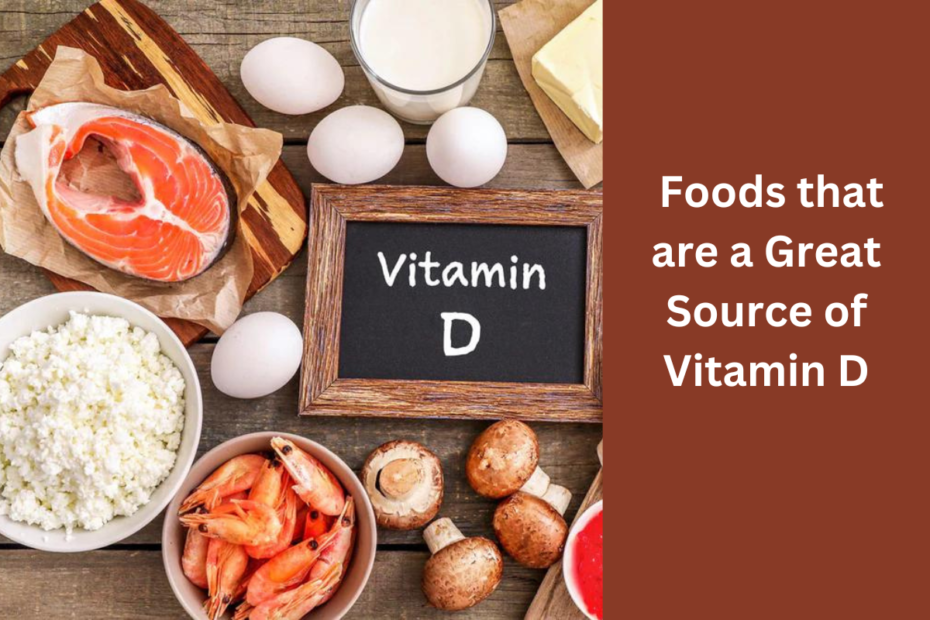Foods that are a Great Source of Vitamin D:- Although you can obtain some vitamin D from exposure to sunlight, it is also essential to consume foods that are rich in vitamin D. Some examples of such foods include dairy products, fatty fish, eggs, and mushrooms. Vitamin D is a substance that is necessary for your body to have. Vitamin D is similar to vitamins A, E, and K in that it is a fat-soluble vitamin. This means that the digestive tract absorbs the vitamin along with the fats that are consumed, and then it is transported into the bloodstream. After that, vitamin D is stored in the liver and the fatty tissues for use at a later time.1.
Foods that are a Great Source of Vitamin D
Your neuron, muscular, and immune systems are all supported by this essential nutrient, which also assists in the absorption of calcium, which is one of the primary components that creates bone.2. Gain a better understanding of the foods that contain vitamin D.
Sources of Vitamin D
Vitamin D can be obtained from exposure to the sun, through diet, and through supplementation. The amount of time that your skin is exposed to sunshine without the use of sunscreen should be between five and thirty minutes per day, or at least twice per week, according to the findings of researchers. This will allow your body to manufacture an adequate amount of vitamin D naturally. On the other hand, sun exposure without the use of sunscreen causes the skin to age and raises the chance of developing skin cancer.3)
ALSO SEE ; 10 Types of Salt and their Health Benefits
Some foods include vitamin D in their natural state, while others are fortified, which indicates that the nutrient has been added to supplement the food.2. Taking a vitamin D supplement is another option; however, it is possible to eat an excessive amount of this vitamin. In the event that you are concerned about your vitamin D levels, you should consult with your healthcare professional.4.
How Much Vitamin D Should You Get?
International units (IU) are used to measure vitamin D because they provide a measure of its effectiveness or potency over time.5. How much vitamin D you require is determined by your age as well as the likelihood that you would suffer from a vitamin D shortage.
The majority of people require approximately 600 international units (IU) of vitamin D on a daily basis, beginning in childhood and continuing through late adulthood. Additionally, this quantity is applicable to individuals who are either pregnant or breastfeeding.3)
The Office of Dietary Supplements at the National Institutes of Health.” D for vitamin.
Every day, infants younger than one year old require 400 international units (IU) of vitamin D. Adults who are over the age of 70 should strive to consume 800 IU on a daily basis.3) It may be necessary for individuals who are at a greater risk of vitamin D insufficiency to consume higher quantities. This contains the following: 6 Breastfed newborns: Because human milk is a poor source of vitamin D, infants who are breastfed or partially breastfed should get a daily supplement of 400 international units (IU) of vitamin D.7
Those who are old: The amount of vitamin D that your skin produces in response to exposure to sunshine decreases as you get older on average. People who have dark skin: People with dark skin have a lower tolerance for the sun’s ability to synthesize vitamin D. Patients that suffer from stomach disorders: Vitamin D absorption is made more difficult by conditions such as Crohn’s disease, ulcerative colitis, and celiac disease.
These conditions make it more difficult to absorb nutrients directly from food. Obese individuals are those who: The specific relationship between the two is not yet fully understood, although it is known that those who have significant levels of body fat are more prone to suffer from vitamin D deficiency.8. Those who have undergone gastric bypass surgery also include: Bypassing (creating a new path around) a portion of the small intestine that is responsible for the absorption of vitamin D, this weight loss technique makes it more difficult for the body to absorb the vitamin.
People who suffer from chronic renal or liver disease: These illnesses can hinder your body’s capacity to convert vitamin D into a form that your cells can utilize.
The following are examples of medications that can have an effect on vitamin D levels: some cholesterol medications, anti-seizure medications, steroids, and weight-loss medications.
In the event that you are at a higher risk for vitamin D insufficiency, you should discuss this with your healthcare professional. In order to determine the amount of vitamin D that is present in your body, they might do a blood test. According to your healthcare professional, if your blood level is low, they will be able to assess whether or not you require a supplement, as well as the appropriate quantity and duration of use.4.
